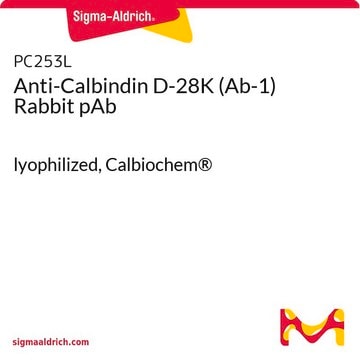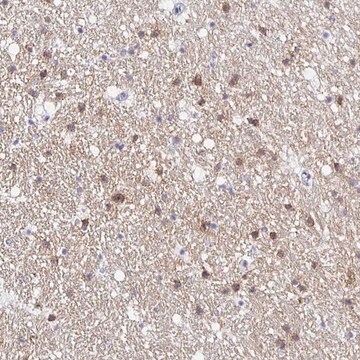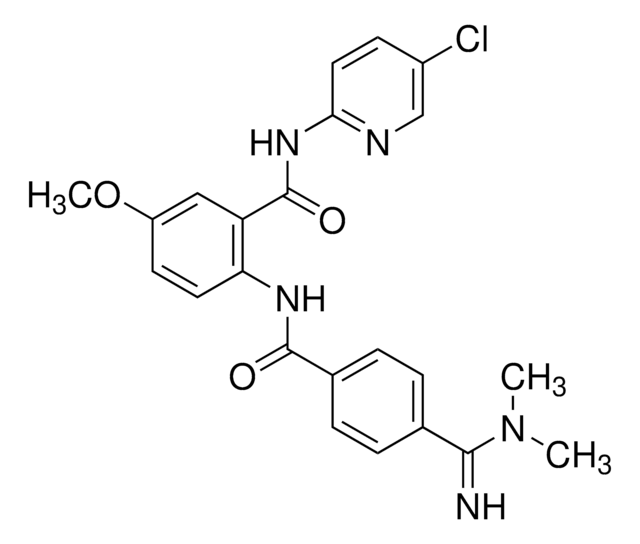AB136
Anti-Dopa Decarboxylase Antibody
Chemicon®, from rabbit
Sign Into View Organizational & Contract Pricing
All Photos(1)
About This Item
UNSPSC Code:
12352203
eCl@ss:
32160702
NACRES:
NA.41
Recommended Products
biological source
rabbit
Quality Level
antibody form
affinity isolated antibody
antibody product type
primary antibodies
clone
polyclonal
purified by
affinity chromatography
species reactivity
canine, sheep, human
manufacturer/tradename
Chemicon®
technique(s)
western blot: suitable
NCBI accession no.
UniProt accession no.
shipped in
wet ice
target post-translational modification
unmodified
Gene Information
human ... DDC(1644)
Specificity
DOPA Decarboxylase (DDC). Reacts with a single band of ~55 kDa by Western blot. Reacts best with human samples; reactivity low with rodent and rabbit species.
Immunogen
Synthetic peptide from the N-terminal region of human DDC conjugated to KLH.
Application
Anti-Dopa Decarboxylase Antibody is an antibody against Dopa Decarboxylase for use in WB.
Immunoblotting: 1:1000
Optimal working dilutions must be determined by the end user.
Optimal working dilutions must be determined by the end user.
Research Category
Neuroscience
Neuroscience
Research Sub Category
Neurotransmitters & Receptors
Neuronal & Glial Markers
Neurotransmitters & Receptors
Neuronal & Glial Markers
Physical form
Affinity-purified antibody. Liquid in 10 mM HEPES, pH 7.5, 150 mM NaCl, 100 μg/mL BSA and 50% glycerol.
Storage and Stability
Maintain at -20 to -80°C in undiluted aliquots for up to six months after date of receipt. Store in a non-self-defrosting freezer. Avoid repeated freeze-thaw cycles.
Legal Information
CHEMICON is a registered trademark of Merck KGaA, Darmstadt, Germany
Disclaimer
Unless otherwise stated in our catalog or other company documentation accompanying the product(s), our products are intended for research use only and are not to be used for any other purpose, which includes but is not limited to, unauthorized commercial uses, in vitro diagnostic uses, ex vivo or in vivo therapeutic uses or any type of consumption or application to humans or animals.
Not finding the right product?
Try our Product Selector Tool.
Storage Class Code
10 - Combustible liquids
WGK
WGK 1
Certificates of Analysis (COA)
Search for Certificates of Analysis (COA) by entering the products Lot/Batch Number. Lot and Batch Numbers can be found on a product’s label following the words ‘Lot’ or ‘Batch’.
Already Own This Product?
Find documentation for the products that you have recently purchased in the Document Library.
Intrarenal dopamine modulates progressive angiotensin II-mediated renal injury.
Yang, S; Yao, B; Zhou, Y; Yin, H; Zhang, MZ; Harris, RC
American Journal of Physiology: Renal Physiology null
Mohammad M Doroudchi et al.
Journal of neurochemistry, 93(3), 634-640 (2005-04-20)
Although L-DOPA is the drug of choice for Parkinson's disease, prolonged L-DOPA therapy results in decreased drug effectiveness and the appearance of motor complications. This may be due in part to the progressive loss of the enzyme, aromatic L-amino acid
Thamara E Osinga et al.
Neuroendocrinology, 101(4), 289-295 (2015-02-14)
Increased dopamine production may be a feature of head and neck paraganglioma (HNPGL). 18F-fluorodihydroxyphenylalanine positron emission tomography scintigraphy has a high sensitivity for detecting HNPGLs. These observations strongly suggest that HNPGLs have the capacity for L-3,4-dihydroxyphenylalanine uptake and conversion towards
Masahiro Nezu et al.
Endocrine journal, 69(6), 705-716 (2022-01-21)
In 2008, a familial noradrenergic pheochromocytoma (PCC) with a KIF1B germline mutation in exon 41 was reported in a 24-year-old female proband and her family. However, in 2020, the same research group reported that the cause of PCC in this
Agnieszka Ciesielska et al.
PloS one, 10(4), e0122708-e0122708 (2015-04-11)
Progressively blunted response to L-DOPA in Parkinson's disease (PD) is a critical factor that complicates long-term pharmacotherapy in view of the central importance of this drug in management of the PD-related motor disturbance. This phenomenon is likely due to progressive
Our team of scientists has experience in all areas of research including Life Science, Material Science, Chemical Synthesis, Chromatography, Analytical and many others.
Contact Technical Service






